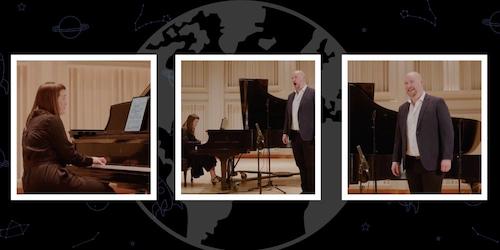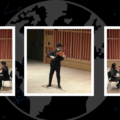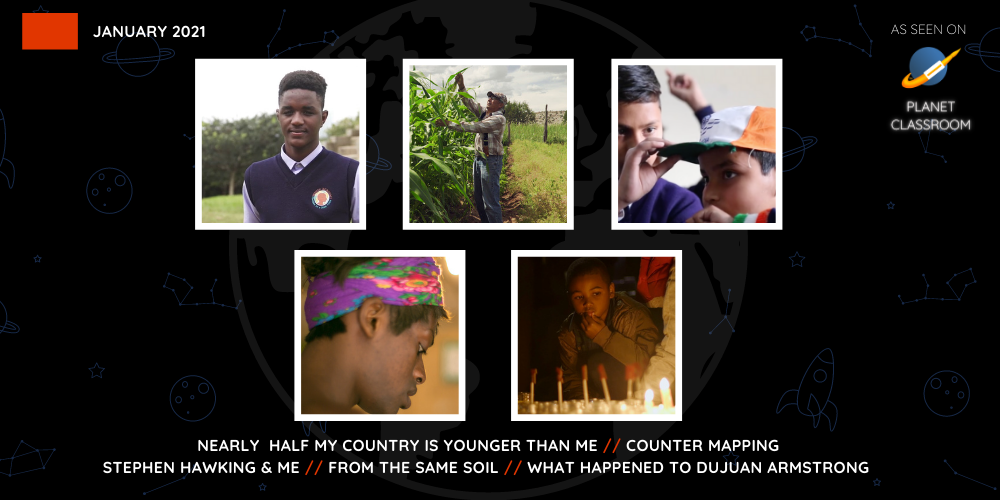This month audiences can screen Schubertiade: Der Taucher on the Planet Classroom Network. This film is curated for the Planet Classroom Network by Bard College Conservatory of Music.
“Der Taucher” (“The Diver”) is a turbulent ballad written by Friedrich Schiller and set to music for bass and piano by early-17th century German composer Franz Schubert. The piece tells the story of a squire who barely survives diving into the ocean in pursuit of a golden goblet, only to fatally attempt to repeat the trial over the offer of an even greater reward.
The featured rendition is performed by baritone Tyler Duncan and pianist Erika Switzer, who expertly take us through the treacherous highs and lows of the story. The performance immerses the audience along with the squire, following “The Diver” on his perilous journey to the bottom of the sea.
The Global Search for Education is pleased to welcome Tyler Duncan and Erika Switzer
Tyler and Erika, what inspired you to select “Der Taucher” for this performance and what do you find unique about this particular composition?
Tyler: Der Taucher is one of my favorite Schubert songs. I love the sense of drama, and the epic fantastical story. It stays relevant placing a spotlight on power differentials in society, and that power has the possibility to corrupt and take advantage of the less powerful on a whim.
On a lighter note, as a child I would practically live underwater. I loved the feeling of weightlessness, the amazing things you could see and the sense of danger. I get such joy out of seeing my son embrace swimming and the draw of the deep. Der Taucher can be a challenge to program as it is the length of a song cycle, but is only one song.
Erika: “Der Taucher” gives the pianist many exciting roles to punctuate and describe Schiller’s story. I love the excited anticipation that Schubert captures in the simplest musical gestures and the rushing torrent of the sea as the story comes to a climax.
Have you performed “Der Taucher” before and if so, what’s different about this presentation?
Tyler: We have performed this before, once nearly 20 years ago and again maybe 10 and again 5 years ago. It is such a joy to return to something you know, yet bring more life experience into it. It is honestly a bit strange performing for video, rather than a live audience. You have to try to imagine who you are singing to, to resist diving internally; you are more self critical when the microphones are there, it can feel less spontaneous. We certainly try to overcome those obstacles.
Erika: As Tyler points out, not having a live audience for this performance made it unique to other performances we have given. The story was written to be shared with people, at social gatherings, and it became so famous in Germany that all school children had to memorize it. When a live German audience listens and anticipates each new line of poetry, a lot of energy builds between listeners and performers. Building this same rapport with a camera is a very particular challenge.
What strengths do you believe make someone a great musician?
Tyler: I believe what makes a great musician is moving beyond the extremely important foundation of technique. I think it is the job of the musician to be a detective, trying to uncover what the composer’s intentions may have been, to be their voice, but adding your own experience and artistry, but without artifice or ego.
Erika: I would add to that by saying that great musicians are able to listen inwards and outwards at the same time. They learn to trust their instincts and the coordination within their body so deeply that they are free to hear and engage in the sounds around them. It takes many years and much dedication to build that kind of trust in yourself.
Do you have any weaknesses that you’re actively working to improve on?
Tyler: So many. So much of our lives are spent trying to overcome habits that have crept in over the years, easy to get, difficult to erase. I’m trying to get to the point where the good habits are way stronger than the bad ones. Like athletes, so much of what we have to overcome are mental blocks and self-doubt.
Erika: Oh yes, always. That is part of what I love about being a musician. I’ve recently become very aware of what a big role fear can play in the way that I practice. It creates instability in my technical foundation because my body is tense or anxious. I’m learning to notice when that feeling arises and then care for myself before I continue by doing breathing exercises or going for walks. Once I feel settled, I return to practice with quieter focus.
Thank you Tyler and Erika!
C.M. Rubin with Tyler Duncan and Erik Switzer
Don’t Miss Schubertiade: Der Taucher on the Planet Classroom Network. This film is curated for the Planet Classroom Network by Bard College Conservatory of Music.







Recent Comments